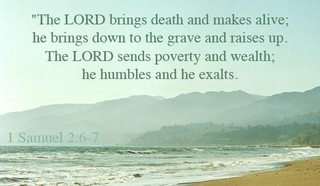- Recent Translations
- All Translations
1 Samuel 2:10
Share
Settings
1 Samuel 2:10 Meaning and Commentary
The adversaries of the Lord shall be broken to pieces
Or Jehovah, Father, Son, and Spirit, "shall break in pieces those that contend with him"; with the Lord, or with his people, or with Samuel particularly; for this may be considered as a prophecy of Hannah concerning her son, what God would do for him against his enemies, that should rise up, contend, and fight with him, as the Philistines; of whom Ben Gersom interprets it, whom the Lord discomfited and broke to pieces; see the literal fulfilment of this prophecy in ( 1 Samuel 7:1-17 ) in a spiritual sense all wicked men are the enemies of God, and of his people, and sooner or later shall be broken to pieces. Some, in a good sense; when they are smitten with the words of his mouth, cut to the heart, and made contrite; are humbled and brought into subjection to him, and their enmity slain and abolished, and they filled with love to him; and are so broken to pieces, that they have nothing to depend upon, or trust in for life or salvation, but apply to Christ alone for it. Others, in an ill sense; and the meaning is, that the wicked shall be utterly destroyed by the Lord, with an everlasting destruction, with an incurable and irreparable one; shall be broken in pieces like a potter's vessel, which can never be put together again, see ( Psalms 2:9 ) ( Revelation 2:27 )
out of heaven shall he thunder upon them:
as the Lord did upon the Philistines in the times of Samuel, when Israel were engaged in war with them, ( 1 Samuel 7:10 ) . And the last vial of the wrath of God, poured out upon his adversaries the antichristian states, will be attended with thunders and lightnings, ( Revelation 16:17 Revelation 16:18 ) , it denotes the terrible manner in which God will destroy his adversaries; the Septuagint version is, "the Lord ascended to heaven and thundered"; hence Procopius Gazaeus, following this version, says, Hannah prophesied of the taking up of the Saviour, and of the mission of the Holy Ghost, and of the preaching of the apostles, and of the second coming of Christ, as follows: the Lord shall judge the ends of the earth; not of the land of Israel by Samuel, as some interpret it, see ( 1 Samuel 7:15-17 ) but of the whole world, and may refer to the government of it in general by the Lord, or to the judgment of it by his Son; for he judges none, but has committed all judgment to him; who at his first coming judged the world, by the ministry of the word in Judea and in the Gentile world, by setting up ordinances, and by qualifying and constituting persons to act in the government of his church under him; and at his spiritual coming he will take to himself his great power and reign, and judge the whore of Babylon; and at his last or second coming he will judge the whole world, quick and dead, righteous and wicked:
and he shall give strength unto his king:
either who was made king in the times of Samuel, Saul, who was the first of the kings of Israel, or David, whom Samuel anointed; and it is true of them both, that the Lord gave them strength to fight with and conquer their enemies; or rather the King Messiah, who in the next clause is called the Lord's anointed, or Messiah:
and exalt the horn of his anointed;
and so the Targum paraphrases the words,
``he shall give strength to his king and enlarge the kingdom of his Messiah.''with which Kimchi agrees, and says, the thing is doubled or repeated, for the King is the Messiah; and to him the words are applied by other Jewish writers F16, ancient and modern. Christ is King over all, angels and men, particularly he is King of saints; he is Jehovah's King, set up and anointed by him from everlasting; was in time promised as such, and in the fulness of time came in that character, and at his ascension to heaven was made and declared Lord and Christ; and through the success of his Gospel in the world has appeared yet more so, and will be still more manifest in the latter day, when he shall be King over all the earth, and especially in his personal reign. Now when "strength" is said to be given him, this must be understood either of strength given to him in human nature, to perform the great work of our redemption and salvation, which required great strength; as a divine Person he needed none, as man he did; or of that strength communicated to him as Mediator, to give unto his people, in whom they have both righteousness and strength; or rather of that power and dominion given him as King particularly; all power in heaven and in earth were given him at his resurrection, and will appear more fully hereafter, when his kingdom will be from sea to sea, and his dominion from the river to the ends of the earth, see ( Daniel 7:13 Daniel 7:14 ) . And the same thing is meant by "horn", which is an emblem of strength, power, dominion, and glory; hence he himself is called the horn of David, and the horn of salvation; it is a name and title given to kings, ( Daniel 7:24 ) ( Revelation 17:12 ) in allusion to the horns of beasts, in which their strength lies to defend themselves, and annoy their enemies; and the exaltation of him prophesied of may respect and include his resurrection from the dead, ascension to heaven, session at the right hand of God, the judgment of all committed to him, and the glorious exercise of his kingly office in the spiritual and personal reigns. This is the first time we meet with the word Messiah, or anointed, as ascribed to a divine Person, the Son of God; who has this name or title from his being anointed, not with material oil, but with the oil of gladness, with the Holy Ghost, and his gifts and graces without measure; and who is called the Lord's anointed, because he was anointed by his Father to be prophet, priest, and King, or invested by him with those offices even from eternity, see ( Psalms 2:6 ) ( Proverbs 8:22 Proverbs 8:23 ) and which was more manifestly declared at his birth, his baptism, and ascension to heaven; see ( Luke 2:40 Luke 2:52 ) ( Acts 10:37 Acts 10:38 ) ( 2:36 ) .
F16 Zohar in Gen. fol. 58. 4. Midrash Echa Rabbati, fol. 53. 3. R. Saadiah Gaon, Comment. in Dan. vii. 13.


